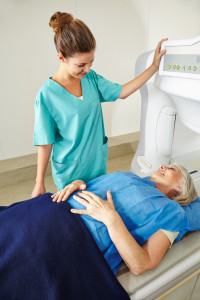 Magnetic Resonance Imaging or MRI can be used to assess the risk of stroke and heart attacks among diabetic patients. Whole-body MRI may serve as a non-invasive tool to help determine the risks. It can help doctors provide preventive measures to aid diabetics in coping up with the said risks. The results of the study are published online in the journal Radiology.
Magnetic Resonance Imaging or MRI can be used to assess the risk of stroke and heart attacks among diabetic patients. Whole-body MRI may serve as a non-invasive tool to help determine the risks. It can help doctors provide preventive measures to aid diabetics in coping up with the said risks. The results of the study are published online in the journal Radiology.
Diabetes is a disease characterized by increased blood sugar levels. Diabetics are also known to develop atherosclerosis or the thickening of the arterial walls faster than non-diabetics. This increases the risks in heart attack and stroke. But the degree of risks may have a wide variation among diabetic patients.
Whole-body MRI has increasingly become an effective method of assessing the cardiovascular systems of people with diabetics. One advantage of this method is that it does not expose patients to radiation. It can also scan a larger body area without any increased risk, making it ideal even for younger patients.
To determine its effectivity, Fabian Bamberg, M.D., M.P.H., from the Department of Radiology at Ludwig-Maximilians University in Munich, Germany and colleagues looked into the predictive value of whole-body MRI for incidence of major adverse cardiac and cerebrovascular events or MACCE in 65 patients with diabetes. The participants underwent a contrast-enhanced whole-body MRI protocol, which included scans of the brain, cardiac and vascular systems. The researchers also conducted follow-up inquiries to assess the rate of MACCE occurring in the study group.
Of the group, 61 patients provided follow-up information. The study analysis showed that after a median of 5.8 years, 14 patients experienced MACCE. Patients who exhibited detectable vascular changes shown on the whole-body MRI experience a cumulative MACCE risk rate of 20 percent at three years. This progressed to 35 percent at six years. Those patients who showed normal whole-body MRI scans did not experience MACCE.
According to Dr. Bamberg, “Whole-body MRI may help in identifying patients who are at very high risk for future events and require intensified treatment or observation.”
“Conversely, the absence of any changes on whole-body MRI may reassure diabetic patients that their risk for a heart attack, stroke or other major cardiac or cerebrovascular event is low,” he further added.
Since whole-body MRI is a relatively new development in medical screening, it may require further studies. But the results so far are very promising, in terms of helping determine certain risk factors such as heart attacks and strokes at the early stages, especially in high-risk patients such as those who suffer from diabetes.
Source: ScienceDaily
Tags: Diabetes News, heart attack risk, mri scan, stroke risk, whole body mri